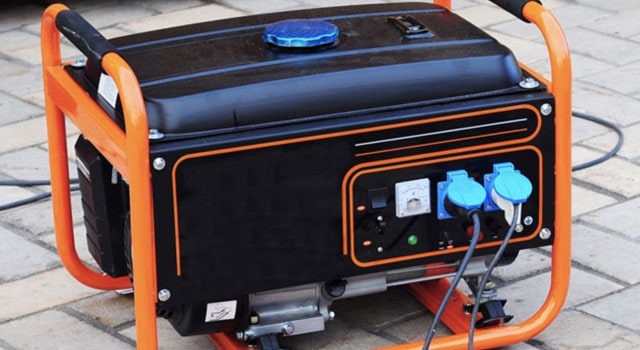
Generators are combustion engines that produce a lot of heat, and can be a fire hazard if precautions aren’t taken.
When running your generator, place it in a fire-safe location away from fuel or flammable objects. Make sure the surface is level, and keep a 5-foot radius clear around the generator. Make sure the generator is in good order, and don’t use it if there are any leaks or damaged wires and hoses.
Never refuel a generator while it’s running or hot. Turn it off and wait for it to cool down before adding more fuel.
How to Store a Generator Properly
There are a few things to keep in mind when you store your portable generator. These will help make sure your generator stays reliable and will start when you need it. Here’s how to store a generator when not in use.
For long-term storage, it’s best to store your generator without any fuel in it. You can empty the tank of fuel by running the motor until empty or by transferring the fuel into an approved container. Drain your generator according to the directions in your owner’s manual.
Most portable generators run on the same regular, unleaded gasoline cars use. You could transfer the gasoline into your car so it doesn’t go to waste.
Gasoline and diesel go bad after a few months, so your generator may not run if it has bad fuel in it. The bad fuel can also corrode internal components of your generator.
When storing gasoline or diesel, use an approved container. Red containers are meant for gasoline, while yellow ones are meant for diesel. Keep the fuel in a well-ventilated area away from potential ignition sources, either in a shed or unattached garage if possible. Add the appropriate stabilizer for the type of fuel to keep it from going bad. Fuel will last longer if stored in a cool, dry place.
If you don’t want to transfer your fuel, stabilize it inside the generator. Add fuel stabilizer before filling the tank up. Run the generator for a minute to distribute the stabilizer.
Remember to check your generator’s oil level before you put it away. If it’s a little low, top it up. While you’re at it, inspect the wires and hoses for any damage or leaks. Give your generator a good cleaning before you put it away, and remove debris from around the muffler, air intakes and controls.
Your generator itself should be stored somewhere cool and dry to prevent moisture from causing corrosion. A storage cover can help keep dust and critters out, but make sure the generator is clean, cool and dry before you cover it up.
Properly storing your generator will help keep it ready for the next time you need it.
Generator Safety Checklist
Keep the following safety tips in mind when you’re operating a generator:
- Never refuel a generator while it’s running or hot.
- Never operate a generator indoors.
- Keep the generator dry.
- Never plug a generator into a wall outlet.
- Do not overload the generator. Operate only essential equipment.
Generator Storage Checklist
And when you’re ready to put your generator away, go through the following list to properly store it:
- Empty the generator of fuel or add stabilizer.
- Check oil level.
- Clean around the muffler, air intakes and controls.
- Store the generator in a dry place.
https://www.plymouthrock.com/resources/how-to-store-your-generator-safely
